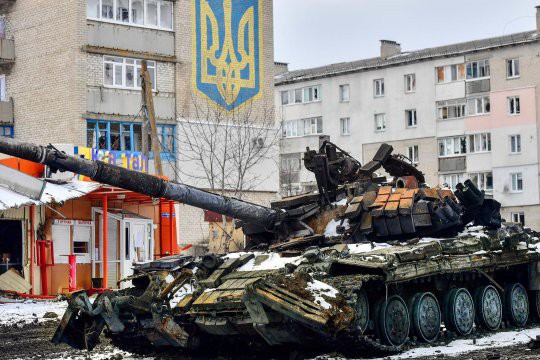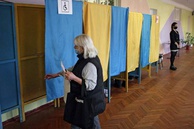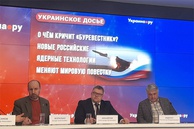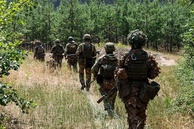The Ukrainian crisis is changing the world, and the consequences of these changes have not yet fully manifested themselves and are not all visible either. Some conclusions and assumptions can already be made, though.
The role of the information factor keeps growing on all sides of the conflict, affecting both the objects of information influence and the initiator of information attacks and special operations. Setting goals, like, for example, “victory for Ukraine on the battlefield” offers a beautiful image, but in case of failure, it turns into a whole range of problems of domestic and external nature:
- the political leadership of the US, EU, and Western countries failed to achieve their stated goals;
- the political leadership of the West has discredited itself in the eyes of their citizens;
- damage suffered by the economies and businesses of European countries due to their decision to stop buying Russian oil and gas; industrial collapse caused by rising energy prices.
A goal was outlined as part of a propaganda onslaught mobilizing public consciousness and ensuring a certain degree of public support. However, this goal was not achieved. Logically speaking, this should have had profound social and political consequences. Western society has long been subjected to informational and ideological brainwashing, including with the help of falsified history, in a bid to bring up an elite who, for the sake of their goals in confrontation with Russia, are ready to sacrifice the interests of their countries, their citizens and voters. In this context, confrontation between citizens and elites is inevitable.
Nuclear weapons remain a powerful deterrent. Therefore, the West has been forced to enlist the help of proxies in the fight against a nuclear power, while simultaneously trying hard to emphasize the absence of a confrontation with a nuclear power and between military-political blocs. That is, NATO does not directly confront Russia in Ukraine, but openly provides Kyiv with everything necessary for such a confrontation.
That being said, the nuclear factor is very much there and is deliberately factored in this confrontation. One of the reasons for the start of Russia’s special military operation (SMO) in Ukraine was Kyiv’s stated intention to obtain a nuclear arsenal. After the start of the SMO, nuclear power plants both in “old” Russian territories (Kursk NPP, Leningrad NPP) and on the newly acquired territories (Zaporozhe NPP) came and remain under threat. In addition, Kyiv was preparing provocations using “dirty nuclear bomb” technology, which were exposed. Perhaps, that’s the only reason why they were not carried out. In addition, Ukraine was supplied with depleted uranium artillery shells, the use of which is fraught with radioactive contamination of territories. These weapons were destroyed by a strike [i] on warehouses in the Khmelnitsky region in the fall of 2023. Commenting on the consequences of the decision to supply such weapons to Ukraine and their subsequent destruction, the Secretary of the Russian Security Council Nikolai Patrushev said, “Our warnings were not heeded. As a result of the destruction of warehouses with depleted uranium shells supplied by the Anglo-Saxons - in order to prevent their use against Russia - Europeans have been recording an increase in radiation in their countries for several months.” [ii]
The introduction of the nuclear factor by the West into the Ukrainian crisis gave rise to a serious discussion about the possibility of using nuclear weapons and the need to change Russia’s military doctrine. The prominent expert Sergei Karaganov proposed lowering the threshold for the possible use of nuclear weapons. Summing up the discussion President Vladimir Putin said that there are enough legal grounds for ensuring Russia’s security with the help of nuclear weapons.
“Why? Everything can be changed; I just don’t see the need for it. There is no situation in which today something would threaten Russian statehood, the existence of the Russian state,” Putin noted, adding that no person “in his right mind” would think of using nuclear weapons against Russia.” [iii]
NATO found itself unprepared for an effective proxy confrontation with Russia.
Factor of technological unpreparedness:
- none of the [Western supplied] weapons showed their superiority over Russian weapons. The Himars MLRS system, recognized as effective during the first months of their use, has long been successfully defeated by Russian air defense. As a result of full Russian control of Ukrainian airspace, the West has not yet delivered its own fighter jets there. The West is also unable to provide Kyiv with a sufficient number of air defense systems to confront Russia both on the frontline and to protect facilities deep inside Ukrainian territory.
- unpreparedness by the Western military-industrial complex (MIC) for a long-term high-intensity conflict, lack of production capacity, rising costs as a result of the energy crisis, unwillingness of private business to invest in the MIC’s production capacity in the absence of a planning time-frame, unclear timeline of the armed conflict, and lack of forecasts for its intensity in the future.
- lack of effective strategies, tactics and methods of warfare. For example, Ukraine’s lack of airpower during its spring counteroffensive was one of the main reasons for its failure. However, Kyiv went ahead with the counteroffensive under political pressure and driven by a desire to achieve political goals.
In these conditions, the Israeli crisis came in very handy for both Washington and the Western world, “based on rules” and NATO manuals. With the failure of the Western training manuals used by the Ukrainians against Russia to bring any tangible results, Israel’s use of aircraft and tanks against those who have neither warplanes nor tanks is working, just as the tactic of clearing out urban areas by destroying all infrastructure. Demonstration of force (aircraft carrier groups in the Mediterranean and Red Seas) is working too - it turns out that the supply of weapons to Israel brings a rehabilitating effect. As a result, the manuals will be recognized as correct, and Ukraine, where the counteroffensive was simulated on a computer and fell flat, will be recognized as some kind of system failure due to the quality of the proxy.
Russia cannot be defeated on the battlefield. This is a hard fact that is being confirmed today. However, no one in the West is going to back down anyway, hence active talk going on about negotiations and agreements in a variety of formats, the meaning of which is crystal- clear to Moscow: the West is not abandoning its intentions to conquer Russia. Negotiations and agreements are needed for achieving a respite, reformatting methods and means of confrontation and accumulation of resources of all types. The cynicism of the West has no moral, political or diplomatic boundaries. Foreign publications (Politico magazine) report that the administration of US President Joe Biden is “quietly” shifting its focus from supporting Ukraine’s goal of total victory over Russia to improving Kyiv’s position in possible negotiations to end the conflict. [iv] This is due to the failed Ukrainian counteroffensive and the US and EU facing difficulties in agreeing further funding for Kyiv.
At the same time, the Western countries advise Kyiv to agree to territorial concessions and start building a layered defense system, including fortifications, razor wire fences, anti-tank obstacles, as well as the construction of a ditch along Ukraine’s northern border with Belarus. Politico thoughtfully explains this position with statements from a White House official: Much of this “strategic transition to defense” is aimed at bolstering Ukraine’s position in any future negotiations.
Russia’s President Vladimir Putin and Defense Minister Sergei Shoigu outlined what really lies behind all this:
- On December 14, President Putin said that the Russian forces were improving their position along the entire frontline.
- In total, since the start of the special military operation, the losses of the Ukrainian army amounted to 383,000 killed and wounded, more than 40 percent since the beginning of the counteroffensive, Shoigu said on December 19. During this period, Ukraine carried out nine waves of mobilization, and is now conducting the tenth.
The ideology of nationalism and Nazism is alive. Indeed, nationalism can serve the basis for reformatting political regimes and public consciousness of entire states. This has been tested in Ukraine. However, history has shown once again that nationalism-Nazism directed against Russia is being defeated. Nationalism-Nazism is declared an ideology of a happy future, but in fact it is an ideology of death for both the state and its citizens who embraced this ideology.
It has become clear once again that the United States, which positions itself as the world’s “number one enforcer” is losing all wars, except cinematic. Therefore, “victory on the battlefield” was initially a PR stunt and the weapons they now use against Russia consist of proxies, revolutions, sanctions and information wars.
Russia provides a good example to the countries across the world of how the West uses all the methods and means at its disposal to achieve its goals. In achieving these goals, the West ignores international and domestic laws of individual countries, and is ready to sacrifice the population, its own and of anyone else, in order to achieve its goals.
Colonial policy remained at the heart of the economic policies of the Western countries, above all the United States and Britain. For the sake of their own wellbeing, London and Washington are destroying the economies of the European countries, are ready to crush those who disagree with sanctions and destroy them both from within by an elite brought up on Western values, with the help of “color” revolutions, or by dividing countries along ethnic lines.
The international community is now convinced that nationalism and Nazism remain the most dangerous thing for all; regimes based on this ideology are always aggressive and militarized, posing a threat to their closest neighbors.
The goals of the Special Military Operation – denazification, demilitarization and neutral status - are outlined as a response to these methods of confronting Russia and attempts to maintain a unipolar world order, and it looks like the majority of the world community understands this.
The views of the author are his own and may differ from the position of the Editorial Board.
----------------------------------------------------------------------
[i] https://ria.ru/20230918/spetsoperatsiya-1897092601.html
[ii] https://www.interfax.ru/russia/930821
[iii] https://lenta.ru/news/2023/10/05/doktrina/
[iv] https://www.rbc.ru/politics/27/12/2023/658c5b8b9a7947dbd2071a02?from=copy
read more in our Telegram-channel https://t.me/The_International_Affairs

 11:24 10.01.2024 •
11:24 10.01.2024 •



























